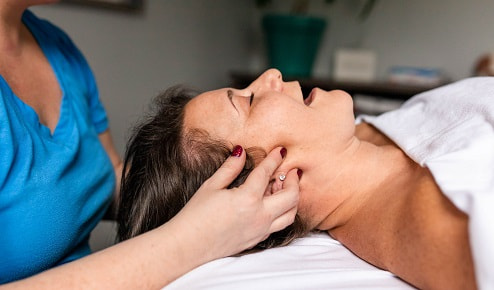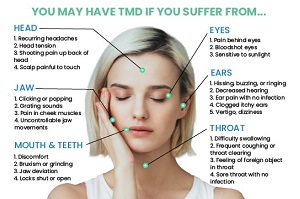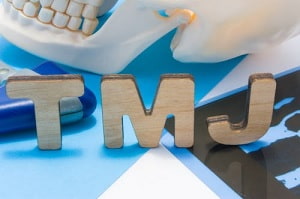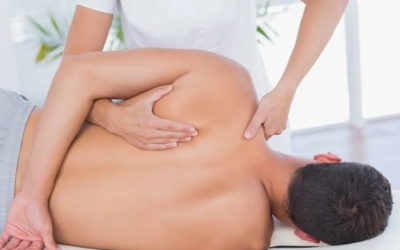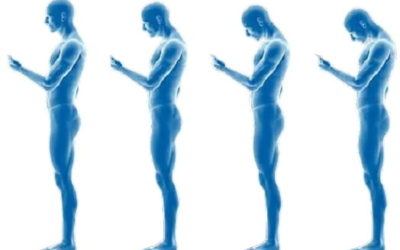can i go to the er with tmj?
TMJ disorder affects the TMJ (temporomandibular joint) and the muscles that surround it. The TMJ is located on both sides of the jaw, connects the jaw bone to the skull, and controls lower jaw movement during communication, chewing, yawning, and swallowing. TMJ disorder causes pain and restricts joint movement and is caused by a variety of factors.
TMJ disorder is caused by genetics, injury, and conditions such as arthritis. It is also common in people who grind their teeth or clench their jaws. TMJ symptoms include pain in the jaw and ear, restricted jaw movement that makes chewing and speaking difficult, open and closed jaw locks, tenderness in the jaw, and facial pain. TMJ pain is often accompanied by headaches, earaches, ringing in the ears, and numb fingers.
Additional Resource:
Learn more about TMJ: What is TMJ?
Unless the condition becomes severe, TMJ disorder does not necessitate emergency dental care. If you have a locked jaw or are in a lot of pain, you should go to the emergency room. Serious jaw injuries and dislocations may also necessitate emergency dental care in the ER.
A TMJ specialist, on the other hand, can treat most TMJ conditions with physical and massage therapy. Severe TMJ cases may necessitate jaw surgery or cosmetic surgery. While emergency care can relieve pain and relax clenched jaws, the effects are only temporary.
If you have a temporomandibular joint disorder, seek professional help from a TMJ specialist. Massage and physical therapy are both drug-free treatments that are extremely effective. TMJ specialists can also diagnose and treat TMJ problems by determining the cause of the problem. These specialists help to prevent future jaw issues and provide long-term relief by treating the condition at its root cause.
Massage therapy, for example, uses non-invasive techniques such as trigger points and friction massage to relax tense muscles and relieve pain.
Remedies for TMJ Disorder
Depending on the severity and causes of TMJ disorder, various remedies and treatment options are available. While some TMJ disorders resolve on their own, others may require medication, physical therapy, cosmetic dentistry, or even surgery.
Massage therapy can also be used to treat TMJ by a medical massage therapist. The following are suggestions for what to do if a patient has TMJ disorder.
Hot and Cold Therapy
Heat and ice are extremely effective at alleviating pain and muscle aches. The application of moist heat to the temporomandibular joint area will aid in the relaxation of your lower jaw muscles. To treat TMJ muscle aches with heat, gently press a warm, damp towel or cloth against your jaw for
Jaw Exercises
Stretching and jaw exercises help to strengthen and relax jaw muscles while also relieving pain. A simple home exercise for a TMJ patient involves gently pressing a thumb up the chin and then slowly opening and closing the mouth. This stretching exercise uses pressure and resistance to help you relax, strengthen your lower jaw muscles, and get rid of pain.
Massage Therapy
To relieve pain and stiffness, you can use massage techniques that target tight muscles and jaw joints. For example, massaging the jaw muscles in circular motions relieves tension and allows for easy jaw movement. Massaging your neck and shoulders relieves muscle pain and discomfort.
Medication
If home remedies fail to relieve severe pain and other TMJ symptoms, Dentists and Doctors can recommend and administer medication to you. TMJ pain medications and pain relievers can help relieve TMJ pain, while anti-inflammatory medications temporarily relax tight muscles and stiffness.
Avoid Straining Jaw Muscles
To avoid further tension and stiffness, someone with TMJ disorder should avoid activities that strain the jaw muscles. Eat softer foods like mashed potatoes and avoid tough and chewy foods, which is an effective tip. Actions such as opening your mouth wide or applying pressure to your jaw should also be avoided because they put additional strain on the jaw muscles. These behaviors include biting into massive burgers, yawning with your mouth open, and supporting your face with your hands.
Stress Management
Most people who are under a lot of stress are more likely to develop habits like grinding and clenching their teeth, which strain the temporomandibular joint. Reducing your stress levels can help avoid further jaw muscle tension. Yoga, meditation, mindfulness, and breathing exercises are all stress-reduction techniques.
Mouth Guard
TMJ dysfunction or disorder can be helped by using cosmetic dentistry devices such as mouth guards, oral splints, and muscle relaxers. A mouth guard can be recommended for a TMJ patient who habitually clenches and grinds their teeth, especially at night. Mouth guards, which should be worn for a few hours, help to relax tight jaw muscles and relieve pain. A dentist can assist in determining the best mouth guard for the patient and recommending how long the device should be worn.
In the event of a locked jaw, do not use your hands to open or close a closed lock. Forcefully opening or closing a jaw lock can injure you and damage the jaw muscles severely. A TMJ specialist, dentist, or massage therapist should be consulted if you have a jaw lock.
Should I go to the ER for a locked jaw?
Unless the condition becomes severe, TMJ disorder does not necessitate emergency dental care. If you have a locked jaw or are in a lot of pain, you should go to the emergency room. Serious jaw injuries and dislocations may also necessitate emergency dental care in the ER.
A TMJ specialist, on the other hand, can treat most TMJ conditions with physical and massage therapy. Severe TMJ cases may necessitate jaw surgery or cosmetic surgery. While emergency care can relieve pain and relax clenched jaws, the effects are only temporary.
If you have a temporomandibular joint disorder, seek professional help from a TMJ specialist. Massage and physical therapy are both drug-free treatments that are extremely effective. TMJ specialists can also diagnose and treat TMJ problems by determining the cause of the problem. These specialists help to prevent future jaw issues and provide long-term relief by treating the condition at its root cause.
Massage therapy, for example, uses non-invasive techniques such as trigger points and friction massage to relax tense muscles and relieve pain.
Effective TMJ Treatment in Richmond, VA
Do you need TMJ treatment in Richmond, Virginia? Attune massage therapy treats temporomandibular joint dysfunction patients in Richmond with safe and effective TMJ and TMD massage therapy.
We provide high-quality, efficient, and dependable services at Attune Massage Therapy, Contact us at (804) 901-2952 or come in today for expert TMJ treatment and medical massage therapy.
Featured on Virginia This Morning:
Jana Powell recently sat down with Jessica Noll from Virginia This Morning to talk about TMD.
Additional Resources:
WHAT ARE THE CAUSES OF SUDDEN TMJ PAIN
WHAT ARE THE CAUSES OF SUDDEN TMJ PAIN? You are sitting on your sofa watching Netflix and suddenly your jaw (temporomandibular joint) starts...
SIGNS AND SYMPTOMS OF TMJ / TMD – THE FULL LIST
SIGNS AND SYMPTOMS OF TMJ / TMD What are signs and symptoms of TMJ? Everyone is unique, and while there are common symptoms of temporomandibular...
WHAT IS TMJ? EVERYTHING YOU NEED TO KNOW ABOUT TMJ
WHAT IS TMJ?TMJ is short for Temporomandibular joint (tem-puh-roe-man-dib-u-lur). Your TMJ is a jaw joint that connects your lower jaw to your...
VISIT THE LEADER IN RICHMOND MASSAGE THERAPY TO GET RELIEF
Resource: VISIT THE LEADER IN RICHMOND MASSAGE THERAPY TO GET RELIEF.We Go Beyond Traditional Relaxing Massage Techniques. At Attune Massage...
–
Resource: AVOID TEXT NECK AKA FORWARD HEAD POSTURE WITH THESE TIPS.What is Text Neck? Walk into any room, and you’re bound to find at least one...
HOW POSTURE CORRECTION EXERCISES IMPROVE TMJ SYMPTOMS
Resource: HOW POSTURE CORRECTION EXERCISES IMPROVE TMJ SYMPTOMS.Look at how you are sitting right now. Would you say that you are exhibiting...
Subscribe and get $10 OFF your next massage!
Enter your name and email address to get updates, information, and other exclusive deals ONLY offered to subscribers!
